"You load sixteen tons, and what do you get? Another day older, and deeper in debt."
| I’m aware that one might accuse me of being always on the lookout for some numbers to graph, and that might even be right. But the table of income tax brackets over the years that I’ve been looking at captured me for days. I found myself returning to it in the spaces of my life – actually making spaces to work on it. There was something in there that was hard to see. So I made logarithmic graphs and 3D graphs [and seemed like a mental patient for a few days the those around me]. This is the full dataset I ended up with. It shows the Tax Brackets from 1940 through 2008 at selected income levels corrected to present dollars. And Joseph thought he had a pretty coat… |

REMINDER: The US Income Distribution isn’t the same as your friends’:

| Dollar Cut-Off (Minimum AGI for tax return to fall into various percentiles | |||||||||
|
|
|||||||||
| Year | Top 0.1% | Top 1% | Top 2% | Top 3% | Top 4% | Top 5% | Top 10% | Top 25% | Top 50% |
| 2001 | $1,324,487 | $292,913 | $199,620 | $161,491 | $140,721 | $127,904 | $92,754 | $56,085 | $28,528 |
| 2002 | $1,191,673 | $285,424 | $193,600 | $159,364 | $139,997 | $126,525 | $92,663 | $56,401 | $28,654 |
| 2003 | $1,262,760 | $295,495 | $198,413 | $162,893 | $142,928 | $130,080 | $94,891 | $57,343 | $29,019 |
| 2004 | $1,548,941 | $328,049 | $216,491 | $175,495 | $152,344 | $137,056 | $99,112 | $60,041 | $30,122 |
| 2005 | $1,848,791 | $364,657 | $236,741 | $188,534 | $162,297 | $145,283 | $103,912 | $62,068 | $30,881 |
| 2006 | $2,044,689 | $388,806 | $250,869 | $199,799 | $171,579 | $153,542 | $108,904 | $64,702 | $31,987 |
| 2007 | $2,155,365 | $410,096 | $261,166 | $207,560 | $178,965 | $160,041 | $113,018 | $66,532 | $32,879 |
| from The Tax Foundation | |||||||||
F.D.R.’s LEGACY:
Whether they mention it or not, when the Republicans talk about the the "tax and spend" Democrats, they are always harkening back to F.D.R.’s New Deal and the Income Taxes during the Depression and World War II. This next graph shows the Income Tax Brackets from 1940 to 1945. [the Incomes have been adjusted to 2008 dollars for all of these graphs using the GDP].

Notice that as he escalated the Tax Brackets to raise money for the war effort, he never got above 35% [today’s tax maximum] for anyone making an equivalent of $400,000/year or less [marked with a horizontal line]. F.D.R. was certainly a "power taxer" during the war, but only of the very rich who could afford the heavy tax burden. On the one hand, that speaks well for F.D.R., but on the other hand, it’s also part of the current problem. People who made more than the eqiuvalent of $1,000,000/year paid dearly. If you made more than the equivalent of $100,000,000/year, you were taxed at 94% [who makes that kind of money?]. F.D.R. demanded a lot from the very, very rich, something many of them resented [and resent to this day]. As to, "But thay was 70 years ago!" Well, I wasn’t alive during the Depression, but it still shaped my [and your] life. And I wasn’t alive in the 1860 South, but it for sure shaped the world I live in. Mr. Roosevelt taxed the hell out of the fabulously-wealthy. While he had no choice, we’re still living with that reputation.
TAX ESCALATION IN RESPONSE TO JOHNSON’S TAX CEILING:
What was the thing that puzzled me about this data? First, here’s the whole dataset recolored to reflect the political parties [red = Republican, blue = Democrat]:
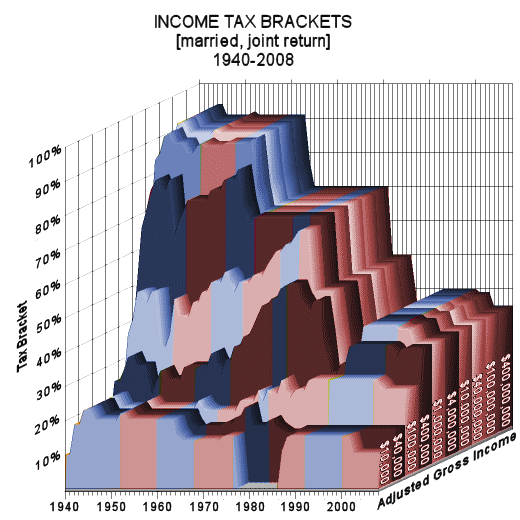
First, notice that the high taxation of the very rich didn’t end with the war. It persisted twenty years until it was reduced by L.B.J. in 1964 by putting a 70% Tax Bracket ceiling in place. But there’s something else. Look at the years from Eisenhower [1952] until Reagan was elected [1980]. There’s a dramatic escalation in the taxation of the very-rich-but-not-fabulously-wealthy groups [equivalent to $400,000/year to $10,000,000/year]. Here it is isolated to make it easier to see:
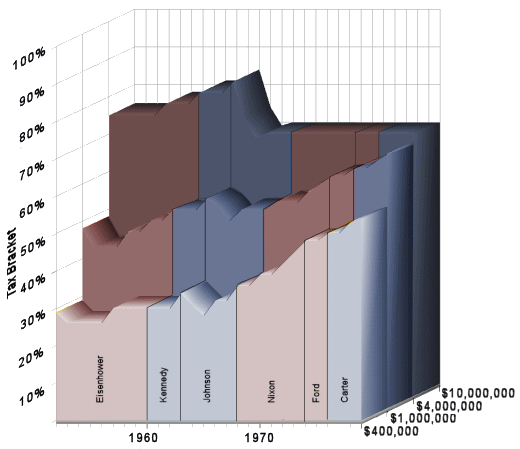
When I first looked at it, I was in my refutation of the "tax and spend Democrats" idea mode, and I thought, "Nixon and Ford certainly look like big taxers to me." Then I thought, "Whoops, Carter did it too." But then I got out of my partisan mindset, and thought, "Of course they bumped up the very-rich-but-not-fabulously-wealthy. They had to make up for what Johnson removed by cutting the taxes on the fabulously-wealthy." To borrow a later phrase, Johnson’s tax cuts "trickled down" to the lower tax brackets.
REAGAN’S TROUGH AND THE NATIONAL DEBT:
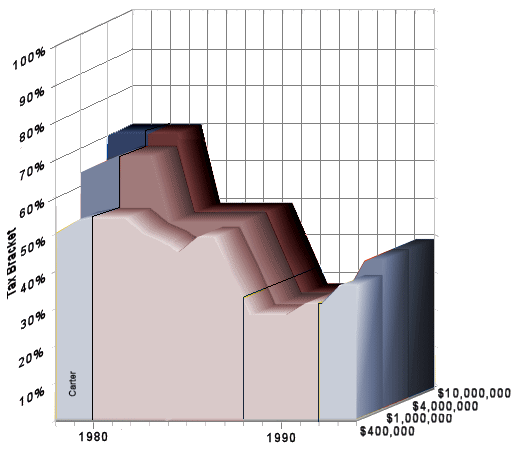
Don’t you just hate it when the solution to the last problem becomes the next problem? The very-rich-but-not-fabulously-wealthy struggled with their increasing tax burden from Johnson’s tax cuts for the fabulously-wealthy, until a champion arrived on the scene who was a friend to both the very-rich-but-not-fabulously-wealthy and the fabulously-wealthy – Ronald Reagan with his sidekick George H.W. Bush. Together, they dug a trough in our tax structure that benefited the fabulously-wealthy and the very-rich-but-not-fabulously-wealthy – subtracting a large hunk of our tax revenue. These cuts couldn’t "trickle down" to the next tax bracket like Johnson’s. Instead, they "trickled down" to the next graph…
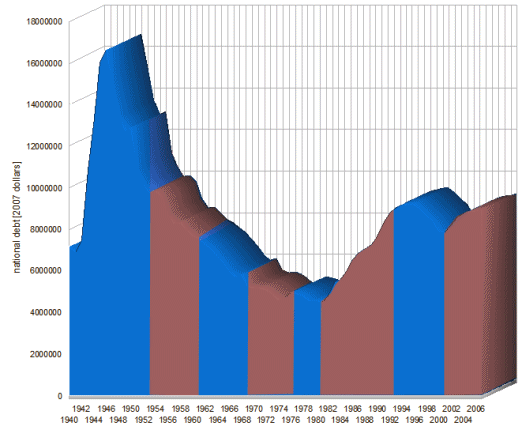
… the National Debt. I suppose the new recipients of the debt are the yet-unborn [note my tastefully declining to make an obvious joke here].
THE FATE OF THE well-enough-off:
In all of this somewhat arbitrary manipulation of the tax system, there’s a group [the well-enough-off] that hasn’t fared so well.
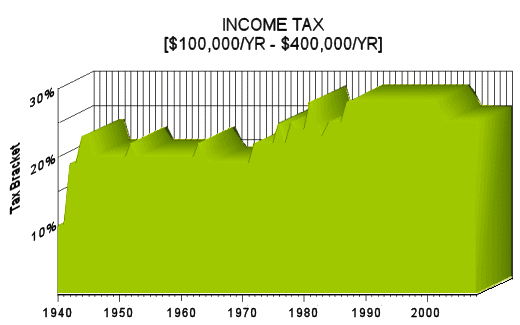
Reagan raised their our taxes, though they were already creeping up in the "trickle down" from Johnson’s cuts. I mention this group because it’s where many of us live. It’s also where many of the teabaggers live, from the looks of them. As they march on Washington, I wonder if it occurs to them that they’re vehemently representing a group they don’t belong to. Do they even know why their taxes crept up?
WHAT THE THUNDER SAID:
What did I learn by obsessing about all these numbers [other than how to use the Open Office Calc graphing utility better]? All of this "tax and spend Democrats" business is just a Talking Point unrelated to any apparent reality. The Republicans are obviously trying to hold on to the free-pass for their elite constituents, little more. Most of this recurrent "tax cut" talk is just smoke and mirrors, similar the the kind of accounting that got the Enron executives sent to the big house and closed the doors of Aurthur Anderson for good. And I learned that George W. Bush’s whining that he wanted to make his tax cuts permanent was as delusional as I thought it was.
I guess I didn’t learn anything I didn’t already think, but now, at least, I know it. We should be close to the end of this silliness. It’s all an illusion. There’s just no place else for things to "trickle down" to any more. It’s time the take a rational look at our income tax structure and revise it to be both fair and to actually pay our bills. It is unreasonable to chide individual Americans for carrying too much credit card debt, while managing our own national accounting in such a tawdry fashion. There’s little question that the Tax Bracketing right now is absurd as it stands. If I recover from all of these numbers, I may have a shot at trying to figure out what is "fair." But for now, back to easy things like Torture, and the endless war on Republican Talking Points…
Sources: data from The Tax Foundation and The Budget of the United States [FY 2009].
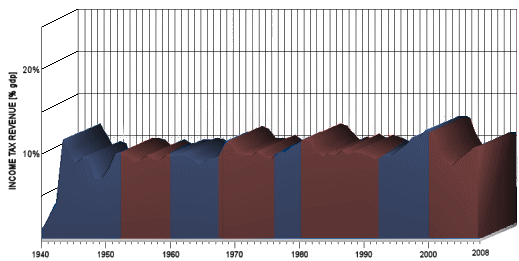
Bravo! Well done. I sincerely appreciate your hard work. I understand a whole lot more than I did last week at th is time.
Mickey — you’re becoming an economist in your retirement.
[…] I’m going to put my own conclusions about this data and the historical data in the other taxing thoughts… post in a separate place. I apologize for the barrage of data here. I post it because it’s […]
[…] towards some rational tax brackets. At other times, it looks something like a war between factions [see taxing thoughts… and more taxing thoughts…]. I think we’ve established that the extreme tax rates of FDR […]